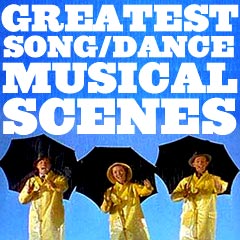
|
|
| C | ||||||
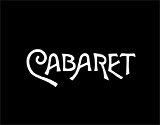
|
This multiple Oscar-winning film by Best Director-winning Bob Fosse, one of the greatest and most unconventional musicals of the 70s, followed its Broadway production debut in 1966 (when it won eight Tony Awards). Among its many Oscar wins, it was the recipient of the award for Best Music, Scoring Original Song Score and/or Adaptation (by Ralph Burns) The film opened with a bawdy but cheerful dance number Willkommen (pictured) by Berlin's seedy Kit Kat Club's androgynous, leering, devilish, white-faced, and cynical emcee/master of ceremonies (Oscar-winning Joel Grey). Then followed the sexy, energetic number Mein Herr (pictured) by hedonistic American dancer/singer expatriate Sally Bowles (Oscar-winning Liza Minnelli) wearing a black derby hat and a deep V-necked costume reminiscent of Marlene Dietrich. The two also performed a duet of Money, Money (pictured): ("Money makes the world go round"). The film was also noted for the chilling scene at an outdoor German beer garden cafe in which a seemingly innocent pastoral ode to Germany sung by a fresh-faced, tenor-voiced blonde youth, Tomorrow Belongs to Me (pictured) turned into a Nazi rally - it was revealed that he was wearing a brown uniform and his arm was wrapped with a Nazi swastika armband - and the patrons joined in the triumphant Nazi anthem: ("Now Fatherland, Fatherland, show us the sign Your children have waited to see The morning will come When the world is mine Tomorrow belongs to me"). Also memorable was Sally's show-stopping, forcefully-sung song of defiance as a star singer, wearing a purple outfit - the title song Cabaret (pictured):
In the final reprise of Willkommen (pictured), the MC grinningly asked: "Where are your troubles now?" before singing: "Auf wiedersehen! A bientot..." - afterwards, he bowed, disappeared behind a curtain, and then a camera pan (with a long snare drum roll and cymbal crash) found two Nazi swastikas (armbands on audience members) reflected on a twisted, mirrored mylar-silver wall. |
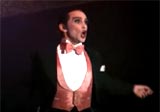 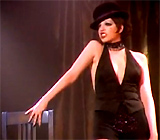  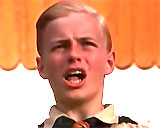  
|
||||
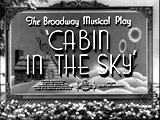
|
Cabin in the Sky
(1943) This Arthur Freed-produced MGM musical fantasy adaptation (Vincente Minnelli in his directorial debut) of the 1940 Broadway hit show, an all-black musical, featured the radiant Ethel Waters reprising her stage role as loving wife Petunia Jackson although Dooley Wilson (as her sinning husband "Little Joe" Jackson) was replaced by the more recognizable Eddie "Rochester" Anderson. Lena Horne portrayed the wicked, satanic and seductive temptress Georgia Brown, along with the other characters: the devilish Lucifer Jr. (Rex Ingram) and the angelic, white military-uniformed General (Kenneth Spencer). This sepia-toned, all-black musical featured:
|
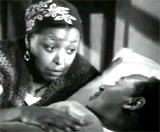 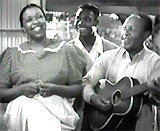 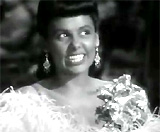 
|
||||

|
Caddyshack (1980) In this infamous comedy, the golf caddies performed a Busby Berkeley-styled synchronized pool dance, to the tune of Tchaikovsky's The Nutcracker Suite ("Waltz of the Flowers") (pictured). The film also featured the famous animatronic gopher that danced to Kenny Loggins' I'm Alright (pictured). |
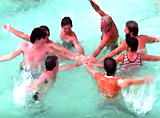 
|
||||
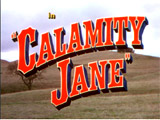
|
Calamity Jane (1953)
David Butler's light-hearted, rousing Warner Bros.' musical was loosely based on historical facts and set in the Old West in the year 1876 in Deadwood, Dakota Territory. It was created in response to the success of Annie Get Your Gun (1950), MGM's musical western based on the life of legendary sharpshooter Annie Oakley (Betty Hutton) - also opposite Howard Keel as rival marksman and love interest Frank Butler. The film was released on the 50th anniversary of Calamity Jane's death. It starred Doris Day (in her best musical appearance) as the Wild West's fast-shootin', tough-talkin', cross-dressin', buck-skinned stagecoach driver/cowboy. The musical was a heterosexualized story about the Golden Garter saloon and her romance with Wild Bill Hickok (Howard Keel). She only drank sarsparilla and hung around saloons. The film had three Academy Award nominations (with one win): Best Musical Score, Best Sound, and Best Original Song (win): Secret Love (with music by Sammy Fain, lyrics by Paul Francis Webster). It was a story about the Golden Garter saloon and Calamity Jane's romance with Wild Bill Hickok (Howard Keel in a role similar to the one he played in Annie Get Your Gun (1950)). Musical numbers written by Sammy Fain and Paul Francis Webster included:
Secret Love (pictured), the Oscar-winning Best Original Song, was sung by Day to express her physical attraction and tomboyish, lesbian leanings toward bustier-wearing Katie Brown. Calamity Jane looked Katie up and down and suddenly realized that women had different bodies than men: "Gosh...you're the prettiest thing I've ever seen. I've never known a woman could look like that. Say, how do you hold that dress up there?" The song finished up with her on horseback:
Calamity entered into competition with Katie for the love of Army Lieutenant Danny Gilmartin - and soon switched her love (after becoming a well-behaved, real and true marriageable woman by dressing in Katie's finery) to Wild Bill Hickok. There was also the competitive duet of I Can Do Without You (pictured) between Keel and Day. |
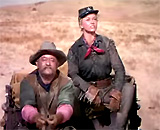 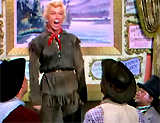 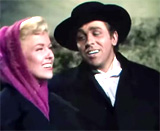    Calamity Jane with Katie Brown (Allyn Ann McLerie)  "I Can Do Without You" |
||||

|
Camelot (1967) Joshua Logan's big-budget and cumbersome film adaptation of the Lerner-Loewe Broadway musical hit (based on T.H. White's The Once and Future King) starred non-singing performers, including actor Richard Harris (replacing Richard Burton) as King Arthur and Vanessa Redgrave (replacing Julie Andrews) as Queen Guenevere. Richard Harris sang How to Handle a Woman (pictured), and I Wonder What the King Is Doing Tonight. She sang such songs (with Harris) as the charming Camelot (pictured), and What Do The Simple Folk Do? Also, French knight Lancelot (Franco Nero replacing Robert Goulet and with singing voice Gene Merlino) performed If Ever I Would Leave You, and the members of the court sang The Lusty Month of May. |
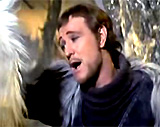 
|
||||
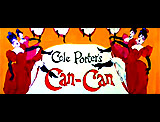
|
Can-Can (1960) Fox's flat and lifeless version of the Cole Porter-Abe Burrows musical play, with an Oscar-nominated Best Score (by Nelson Riddle), starred Shirley MacLaine in one of her earlier films as Simone Pistache - the owner/operator of an 1895 Paris Night Club that specialized in the forbidden, skirt-lifting dance. She starred alongside miscast Frank Sinatra as her lawyer boyfriend François Durnais. The musical also starred Maurice Chevalier and Louis Jourdan (from MGM's Best Picture-winning Gigi (1958)), and exuberant dancer Juliet Prowse as a can-can girl in the major Can-Can dance finale (pictured). One of the best numbers was Sinatra's It's All Right With Me. |

|
||||

|
Can't Stop the Music (1980) This infamous musical (a Razzie Awards winner) starred the popular singing group the Village People - and pre-transgender Bruce Jenner. The opening credits sequence was a split-screen montage of Jack Morell (Steve Guttenberg) skating on the sidewalks and streets of New York, to the sound of The Sound of the City (sung by David London). It featured the notorious gay-themed Y.M.C.A. number, Liberation (pictured) and Magic Night by the Village People, Danny Boy (by Glenn Hughes) (pictured), the knock-off Busby Berkeley-like Milk Shake number (pictured), and the finale Can't Stop the Music. |
 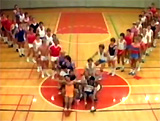 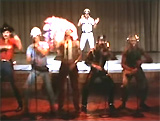 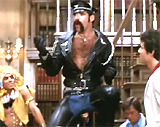 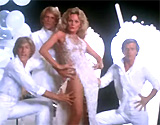
|
||||
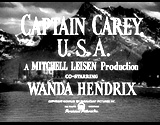
|
Captain Carey, U.S.A. (1950)
Martha Albrand's novel "No Surrender" was the basis for Paramount's and producer/director Mitchell Leisen's dramatic, noirish war-time thriller film. It starred Alan Ladd as the title character Captain Webster "Web" Carey, a daring saboteur-agent who had survived a deadly attack during the war. He returned to post-war Italy (to a village near Milan) to avenge the deaths of over two dozen villagers and to find the traitor who had betrayed his WWII O.S.S. team. By the film's conclusion, it was determined that Baron Rocco de Greffi (Francis Lederer) - the husband of Web's ex-Italian girl friend, Giulia (Julie) de Cresci (Wanda Hendrix) - was the betrayer or traitor. The Oscar-winning Best Song Mona Lisa was made a mega-hit by Nat King Cole at the time, although in the film it was sung by Charlie Spivak with Tommy Lynn. The song was written by Jay Livingston and Ray Evans. Many recording artists have also performed the song since then, and it became the theme song for Mona Lisa (1986, UK) starring Michael Caine and Bob Hoskins. [Note: Mona Lisa was the first song from a non-musical picture to win the Best Original Song Oscar.] In the film's beginning, the OSS' lookout Mario (Sergio de Karlo) sang Mona Lisa (briefly rendered in Italian) - a signal to warn that German troops were near - not as a love song. Also, later in the film, the tune was again played instrumentally on an accordian (pictured) (when it was called "the tune of the partisans"). |
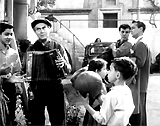
|
||||
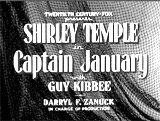
|
Captain January (1936) The film was a remake of the 1924 film featuring silent superstar Baby Peggy Montgomery. Shirley Temple (as precocious, cheerful orphan Star) provided a memorable dance/song rendition of At the Codfish Ball (pictured) with partner Buddy Ebsen (as unemployed Paul Roberts) on the street of a New England fishing village. In addition, Shirley Temple, Guy Kibbee (as Cape Tempest, Maine lighthouse keeper Captain January) and Slim Summerville (as tattooed cribbage-playing government inspector Captain Nazro) joined in a take-off of the then-popular operatic aria in movie musicals. They used nonsense words to perform Donizetti's Chi mi freno in tal momento? (pictured) (aka "Sextet" from "Lucia di Lammermoor"). |
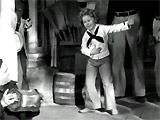 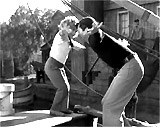 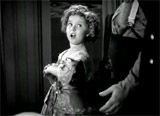
|
||||
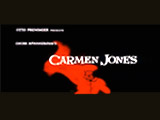
|
Carmen Jones (1954) Oscar Hammerstein II's 1943 stage musical was updated (with new lyrics and storyline) and adapted for the screen - and directed by Otto Preminger for Fox Studios. This updating of Georges Bizet's Carmen opera starred an all-black cast with a Best Actress Oscar-nomination for Dorothy Dandridge (the first time an African-American performer had been nominated in the category). Dandridge starred as the sexily-wicked, femme fatale title character Carmen Jones (singing voice dubbed by opera singer Marilyn Horne) opposite Harry Belafonte (singing voice dubbed by LeVern Hutcherson) as her infatuated lover and army corporal Joe. The film's show-stopping numbers included:
|
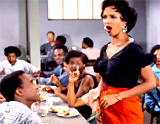 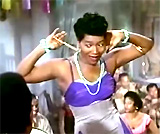
|
||||
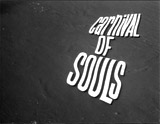
|
Carnival of Souls (1962) Director Herk Harvey's disturbing, low-budget horror thriller was notable for its macabre "dance of the ghouls" in Saltair - an abandoned, condemned and closed-down lakeside amusement park, where female car wreck survivor Mary Henry (Candace Hilligoss) was lured by a white-faced zombie. |
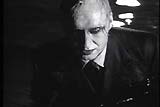
|
||||
(alphabetical by film title) Introduction | A-1 | A-2 | B-1 | B-2 | B-3 | C-1 | C-2 | D-1 | D-2 | E | F-1 | F-2 | G-1 | G-2 H-1 | H-2 | I-J | K | L-1 | L-2 | M-1 | M-2 | N-O | P-1 | P-2 | R-1 | R-2 | S-1 | S-2 | S-3 | T | U-V | W | X-Z |